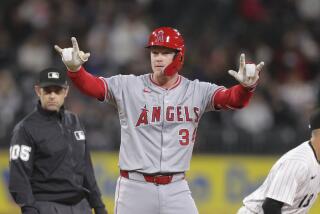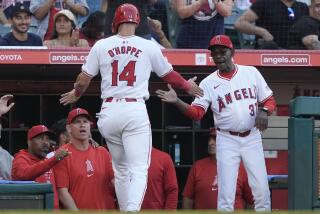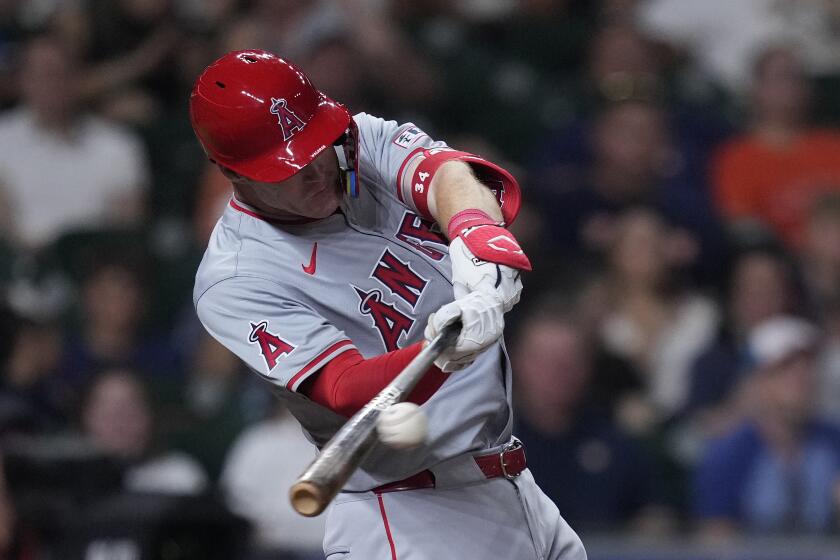The Great Steroids Debate: What about Matthews’ denial?
Maybe now he’ll stop being cursed for using drugs he didn’t use
By Tim Marchman
I’m glad to hear Gary Matthews Jr. has denied using a drug for which he seems to have had a prescription. To be accused by anonymous government agents of the legal use of a drug that wasn’t banned by baseball at the time one is alleged to have used it is a very serious thing for a ballplayer, but Matthews has gone out of his way to put the past behind him. Hopefully Angels fans can now stop cursing Matthews for using drugs he didn’t use, and instead put their energies into cursing him for soaking up at-bats while being the team’s fifth- or sixth-best outfielder.
Phew!
By Mat Gleason
As a baseball fan and an Angels paritsan, I am relieved to hear Gary Matthews, Jr. make that statement. This lets spring become about the possibilities of triumph instead of the inevitabilities of depositions. Let’s play ball!
Now, back to the original question: What punishment is appropriate for performance-enhancing drugs?
Take the ‘guarantee’ out of contracts
By Mat Gleason
“If you had a pill that would guarantee a pitcher twenty wins, but might take five years off his life, he’d take it.”-- Jim Bouton, Ball Four (1971)
Tim,
Anyone familiar with the words of Jim Bouton should not be too surprised by performance enhancers. We don’t know if, when a favorite mid-century baseball player passes away, whether heavy use of greenies played a role. Speed could be creepier and harsher on the body than some of the steroids out there. No telling if the deadball era was because amped infielders of later generations got to the ball so much faster despite having not slept the entire roadtrip.
Since the temptation to try something that promises a three-hour high and whose consequences are “a long way away” arises in the average 15-year old, adding in the competitive will, the quest for glory and the chance to financially set one’s family up for life will outweigh the negative unproven percentages of a distant future.
A few years back, I read that first baseman Wally Joyner admitted to having tried PEDs for a week in 1998 before flushing them away in remorse. A star at Brigham Young University, Joyner was the paragon of wholesomeness as a player for the then-California Angels in the 1980s. If we had lost Wally -- if even for a week -- we’d have lost the war.
The punishments for drugs in professional sports have been, historically, laughable. Pitcher Steve Howe had a half-dozen lifetime suspensions and died tragically last year at 48 with methamphetamine in his system. Marijuana is not currently banned at all. Want to make a libertarian baseball fan howl? Mention the bag of pot found by pitcher Darryl Kile’s bedside when his body was discovered in a Chicago hotel.
Punshment considerations have to be in the context of how the offending player has negatively impacted the game’s integrity. Does this affect a particular team’s branding? Did this player take the job of someone else on the roster? The MLB Players Union is notoriously star-oriented and its advocacy of privacy privileges has cost many of its qualified members substantial salary as their jobs have been taken by their “union brothers” on the juice. The simplest punishment would be that players who are caught involved in banned substances and illegal drugs, be they recreational or performance enhancing, lose the right to have a guaranteed contract.
There is a denial of death, of consequence, inherent in drug use. Athletes shrug off health concerns and legal “details” because the family is taken care of once the ink is dry. If the wives and children were suddenly exposed to a little risk, it wouldn’t take much more of a village to keep a majority of jocks in line.
Mat Gleason is the publisher of Coagula Art Journal. As “RevHalofan” he blogs daily about the Angels at Halos Heaven.
It has ever been thus, so let them play!
By Tim Marchman
Mat,
A slight correction -- marijuana actually is banned by Major League Baseball. Personally, I sleep better at night knowing that if Alex Rodriguez’s friends are ciphering, he can opt out with the face-saving excuse that he has to pass a urinalysis.
Happily, we have much else to agree on. I’d go further than you will, in fact, and not only concede the long and inglorious history of drug use in baseball, but propose that the game’s steroid problem probably dates back well past Jose Canseco. We know that NFL players, future governors, pro wrestlers, and Warsaw Pact freaks were juicing in the 1970s. Are we really supposed to believe that none of our prominent ballplayers were living better through chemistry? Given the ease with which people jump to conclusions based on off-season weight changes, sculpted biceps, and so on, I’m really surprised so few people retroactively accuse noted weightlifters like this guy.
This being so, shouldn’t we just admit that the natural state of play in baseball is saturated with greenies, Deca-Durabolin, hGH, estrogen, and anything else ballplayers feel will give them an edge? The problem I have with your stance here (aside from the idea that baseball’s already draconian testing regime isn’t stringent enough) is that you seem to take the natural state of baseball affairs to be one in which no one is on drugs, which is completely at odds with the reality of the game dating back to its sepia-toned glory days. When Pete Alexander struck out Tony Lazzeri in the 1926 World Series his performance was enhanced by then-illegal alcohol. Does that sort of thing offend the game’s integrity? At what point do we admit that drugged-up ballplayers are not the exception, but the norm?
Baseball players, like all high-level athletes, are insane and often dumb. Every 16-year-old thinks he’s immortal; ballplayers never get over that. It’s inherent in the job. We don’t have to shed tears over what these guys do to themselves in search of competitive advantages. Most guys who use steroids would snort ground glass if they thought it would give them an edge. Facing up to that means that we have to face up to the fact that the game will never be and has never been clean, and that the only drug enforcement measures that are worthy of support are the ones the players take on voluntarily through collective bargaining. They’re the ones who have to compete with Ground Glass Gus and his ilk; why should we be more outraged about it than they are?
We don’t need to protect ballplayers from themselves and their juiced-up peers. They have a union and other legal mechanisms by which they can do so, to precisely the degree they feel appropriate. If you don’t think that’s good enough, don’t spend any money on baseball. Don’t have any illusions, though, that the game is now different from any other sport, any other high-stress profession, or different from the game we all watched when we were kids.
For that matter, given the sheer length of time steroids have been used to enhance athletic performance, baseball isn’t really any different from the game my great-grandparents watched when they were kids. Maybe Jeff Kent was on to something after all!
Tim Marchman writes about baseball for the New York Sun. He is currently mourning Captain America, who was an early product of steroids.
Real life trumps libertarianism ... again!
By Mat Gleason
Tim,
You make a strong case for ignoring the entire scope of this thing with a classic libertarian argument. And like many of those arguments, it is airtight in a vacuum. The fact remains that players are people and the messiness of everyday life intrudes on utopian ideals. A quick refresher of Bob Dylan 101 for you:
To live outside the law, you must be honest. I know you always say that you agree, but where are you tonight, sweet Marie?
When anyone is flirting with the edges of what society condones, the chance always exists of falling off that edge. The abyss stares back at you -- the integrity of who you are, what you represent and what you have become will inevitably be challenged when you fray the border of the social contract.
Just because some or most of the people involved in a particular edgy behavior can and do survive the ordeal does not mean that everyone does. The game needs boundaries of behavior and a code of conduct. In the 1920s, the gamblers in the stands got too close to the field. In the 1980s, the coke-whores got too close to the locker room. We know what happened when Pete Rose made a mockery of gambling ordinances.
All grandstanding about health and teenage weightlifters looking to baseball players aside, the use of prescription and/or banned substances flirts with the seamier side of things. Not to get too George Lucas on you, Tim, but the players are going toward the dark side, and the people who are there every day are not moving toward the light. At some point, the personalities of the people on the edge will have a negative influence on the integrity of the game. The game must be held to the highest standards and the people who are lucky enough to be closely involved in it are subject to a higher code of behavior than the rest of us.
Nobody is up in arms about creatine abuse. You can buy it over the counter. The bottom line is that what is legally allowed does not have a social stigma that could potentially tear at the threads of integrity of the game.
Mat Gleason is the publisher of Coagula Art Journal. As “RevHalofan” he blogs daily about the Angels at Halos Heaven.
More to Read
Go beyond the scoreboard
Get the latest on L.A.'s teams in the daily Sports Report newsletter.
You may occasionally receive promotional content from the Los Angeles Times.





